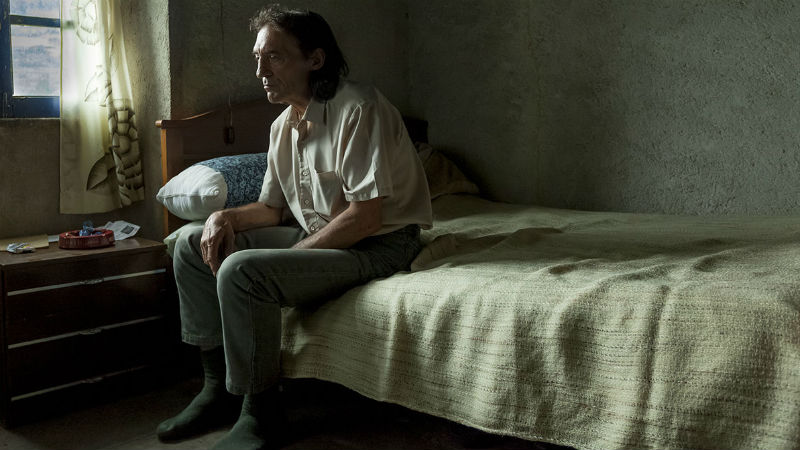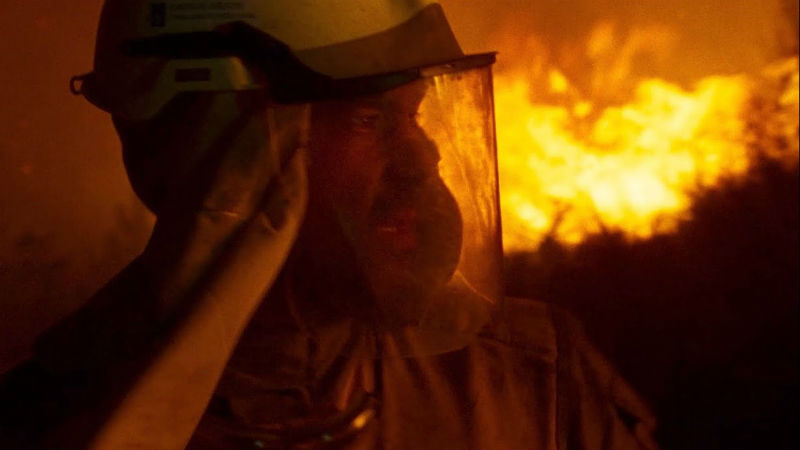




This a sensory experience. One that you feel with your skin. Feel the heat, feel the fog, feel the humidity. Director Oliver Laxe and his crew received fire training in order to join the Galician forest brigade as they battle the very large fires that routinely castigate the Northeastern nation of Spain. A very audacious feat. You will be caught right in the middle of hell, surrounded by collapsing trees and gigantic flames. Laxe didn’t even know whether his film equipment would survive. Fortunately for us, it did. Despite this, plus the fact that the actors use their real names, Fire Will Come is not a documentary.
The bulky, rough-looking and yet somehow gentle and affable Amador has just left prison after a two-year stint for arson. He returns to his mother Benedicta, a bespectacled and petite octogenarian, so wrinkly that her mouth has shrunk and lips are hardly visible, donning a old rag dress and dirty trainers. Despite her age and small frame, Benedicta’s presence is momentous. The actress delivers an extravagantly demure performance. She is delighted to have her son back, welcoming him with a concise “Are you hungry?”

The story takes place in the deep Galician countryside, a region of Spain famous for non-savoury weather. There’s snow and constant rain. Once the soils dries up, comes the titular fire. It’s never entirely clear why Amador set fire to the forests, or even whether he is indeed guilty. We learn that he has a profound dislike of eucalyptus trees because they have “kilometres-long roots that suffocate other plants”, in his own words. Eucalyptus trees are not indigenous to Galicia, but they nowadays they are grown across the nation for their timber. We can only speculate that Amador became a pyromaniac because he wished to rid his land of the invasive species.
The film is entirely spoken in Galician language. A remarkable feature, absent from another recent and equally superb Spanish film set in Galicia, Isabel Coixet’s Elisa and Marcela. The director Laxe is the child of Galician immigrants, just like myself. In fact, this was the first time in my life I watched a film in my father’s native tongue. The depiction of the Galician countryside is extremely accurate. The verdant hills, the ancient stone houses, the old-fashioned iron ovens, the small-scale cattle ranching (Benedicta has about five cows with whom she has a very tender relationship). And, of course, the menacing fires (in 2011, more than 2,000 fires burnt nearly 2% of the Galicia’s territory). The characters (mostly peasants) are played by locals, and they too are very convincing. Laxe conducted the casting himself.

The lyricism of Fire Will Come is conspicuous. The contrasting images of Benedicta walking through the woods before and after the fire are astounding. There’s Tarkovsky everywhere: the cows of Andrei Rublev (1966) the exuberant green fields of Stalker (1979), the foggy vastness of Nostalghia (1983) and the house on fire of The Sacrifice (1986). Plus the the meditative pace of all of his films. The operatic soundtrack is sombre and dramatic, with songs by Vivaldi and Haas. Leonard Cohen’s Suzanne is also played to great effect during a short car ride. There’s also a very disturbing sequence of a wounded horse running emerging from the arson. A sordid and painful reminder of the unforgiving might of fire.
All in all, this if the perfect combination of sound and imagery. A breathtaking movie. Literally.
Fire Will Come premiered at the BFI London Film Festival, when this piece was originally written. It won the Jury Prize of the Un Certain Regard strand of the Cannes Film Festival earlier this year, a much deserved accolade. In cinemas Friday, March 20th. On Curzon Home Cinema on Friday, April 3rd (following cancellation of theatrical release due to the coronavirus pandemic).
















